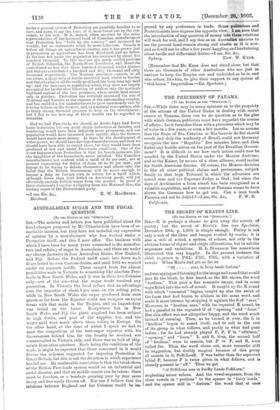AUSTRALASIAN SUGAR AND THE FISCAL QUESTION.
[To THE EDITOR OP THE "SPECTATOR."] Sin,—The articles and letters you have published about the fiscal changes proposed by Mr. Chamberlain have been of re- markable interest, but they have not included any expression of opinion by a manufacturer who has worked under a Protective tariff, and this I now offer. The business with which I have been for many years connected is the manufac- ture and refining of sugar in Australasia, and there are under my charge factories in four Australian States, New Zealand, and Fiji. Before the Federal tariff came into force each State levied its own Custom-duties, and until 1901 we worked under six separate tariffs. These ranged from the almost prohibitive scale in Victoria to something like absolute Free- trade in New South Wales, and it was in these two Colonies only—out of the six—that the sugar trade received any protection. In Victoria the local refiner had an advantage over the importer of about 1 per cent. on the selling price, while in New South Wales the sugar produced from cane grown so far from the Equator could not compete on equal terms with that made in the Tropics, and an import-duty was levied on the latter. Everywhere but in New South Wales and Fiji the plant required has been subject to high duties, and part of the supplies, too, and the wages paid were much above those ruling in Europe. On the other hand, at the time of which I speak we had to meet the competition of the beet-sugar exporter with his Government behind him, for the bounty he received was countervailed in Victoria only, and there was no lack of ship- ments from other quarters. Such being the conditions of the trade, it might be expected that those concerned in it would favour the schemes suggested for imposing Protection in Great Britain, but this is not the direction in which experience has led me. My unalterable conviction is that the break-down of the British Free trade system would be an industrial and social disaster, and that no middle course can be taken ; there must be freedom, or a bondage growing year by year more heavy and less easily thrown off. Nor can I believe that the relations between England and her Colonies would be im- proved by any preference in trade. Some politicians and Protectionists here express the opposite view. I am sure that the introduction of any question of money into these relations will work for evil, and I say this as an Australian anxious to see the present bond remain strong and elastic as it is now and as it will not be after a few years' haggling and hUckstering about tariffs and differential duties.—I am, Sir, &c.,.
[Remember that Mr. Knox dues not stand alone, but that there ars.. thousands of other Australians who are just as anxious to keep the Empire one and undivided as he is, and who refuse, like him, to give their support to any system of " tied-house " Imperialism.—ED. Spectator.]






































 Previous page
Previous page